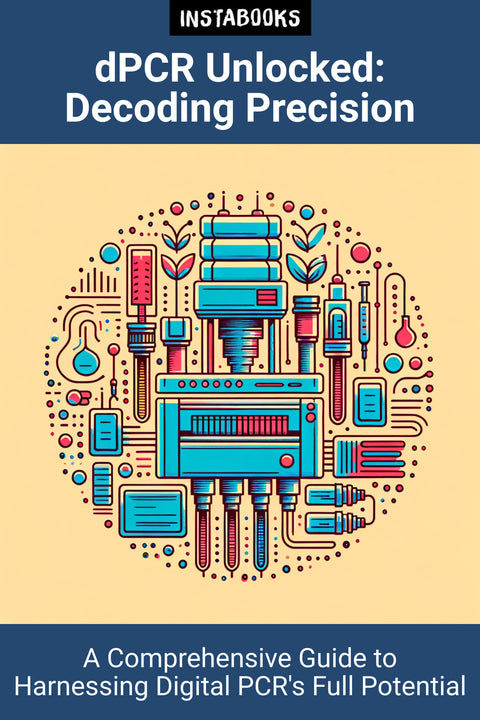
dPCR Unlocked: Decoding Precision
A Comprehensive Guide to Harnessing Digital PCR's Full Potential
Included:
✓ 200+ Page AI-Generated Book
✓ ePub eBook File — read on Kindle & Apple Books
✓ PDF Print File (Easy Printing)
✓ Word DOCX File (Easy Editing)
✓ Hi-Res Print-Ready Book Cover (No Logo Watermark)
✓ Full Commercial Use Rights — keep 100% of royalties
✓ Publish under your own Author Name
✓ Sell on Amazon KDP, IngramSpark, Lulu, Blurb & Gumroad to millions of readers worldwide
Introduction to dPCR Unlocked: Decoding Precision
Welcome to the forefront of molecular diagnostics with "dPCR Unlocked: Decoding Precision". This book is designed to take researchers and clinicians on a detailed journey through the world of digital PCR, a revolutionary method for the absolute quantification of nucleic acids. With advancements in microfluidics and the unique capabilities of dPCR, this book aims to equip you with the knowledge to master this powerful technology and apply it to real-world challenges in clinical diagnostics and beyond.
A Deep Dive into Key Features
Explore the significant features that set dPCR apart from traditional methods. In this book, we delve into the intricacies of sample partitioning, where the magic begins, and each target sequence enjoys its own space within discrete, water-in-oil droplet partitions. This leads to unmatched sensitivity and specificity, crucial for applications such as rare sequence detection, Copy Number Variation (CNV) analysis, and liquid biopsies. The detailed explanation of absolute quantification techniques offers insights into how dPCR measures the exact number of target molecules without reliance on calibration standards.
Applications and Innovative Uses
dPCR is not just another PCR technique; it’s a game-changer. Our book highlights its pivotal applications. Learn how dPCR becomes indispensable in detecting rare mutations with high precision, assessing CNVs for genetic insights, and transforming cancer diagnostics through liquid biopsies. By reading "dPCR Unlocked: Decoding Precision," you'll understand how to leverage these applications to push the boundaries of what’s possible in molecular diagnostics.
Technical Aspects and Instrumentation
To fully appreciate dPCR, one must understand the underlying technology and instruments. We provide an in-depth analysis of various dPCR systems, from microfluidic chips to droplet techniques, empowering you to choose the best tools for your research. Learn about the methodologies in fluorescence-based detection that enhance accuracy and efficiency in data analysis. This section is a must-read for those looking to integrate state-of-the-art technology into their research toolkit.
Future Trends and Clinical Implications
The future of digital PCR is bright, with promising advances on the horizon. We explore the potential of multiplexing strategies and isothermal amplification, offering glimpses into the emerging trends that stand to revolutionize diagnostics. By understanding these trends, you will be positioned at the cutting edge of research and clinical practice, ready to adapt and innovate in the rapidly evolving field of molecular diagnostics.
Table of Contents
1. Understanding Digital PCR- Evolution and History
- Principles of dPCR
- Significance in Modern Science
2. Sample Partitioning Techniques
- Microfluidic Advancements
- Partitioning Mechanisms
- Impact on Sensitivity
3. Absolute Quantification Methods
- Droplet Digital PCR
- Poisson Statistics Applications
- Case Studies in Quantification
4. High Sensitivity Applications
- Rare Mutation Detection
- Low Template Concentration Handling
- Maximizing Specificity
5. Detecting Rare Sequences
- Techniques for Accurate Detection
- False Positive Reduction
- Clinical Relevance
6. Copy Number Variation Analysis
- Role in Genetic Studies
- Techniques and Tools
- Implications in Healthcare
7. Liquid Biopsy Revolution
- Circulating Tumor DNA Detection
- Non-Invasive Diagnostics
- Integration in Cancer Treatments
8. Instrumentation and Tools
- dPCR System Types
- Choosing the Right Instrument
- Cost-Benefit Analysis
9. Data Analysis in Digital PCR
- Fluorescence Detection Methods
- Statistical Approaches
- Software Tools
10. Multiplexing Strategies in dPCR
- Simultaneous Target Analysis
- Innovations and Methodologies
- Future Possibilities
11. Isothermal Amplification Techniques
- Alternatives to PCR
- Efficiency and Precision
- Research Innovations
12. Future Trends and Developments
- Emerging Technologies
- Potential Clinical Applications
- Roadmap to Future Research
Target Audience
This book is intended for researchers, scientists, and clinicians involved in molecular diagnostics and those looking to enhance their understanding of digital PCR systems.
Key Takeaways
- Comprehensive understanding of digital PCR and its historical development.
- In-depth knowledge of key features like sample partitioning and absolute quantification.
- Insights into high sensitivity applications, including rare mutation detection and CNV analysis.
- Detailed exploration of technical aspects and instrumentation in dPCR technology.
- Awareness of future trends such as multiplexing strategies and isothermal amplification.
